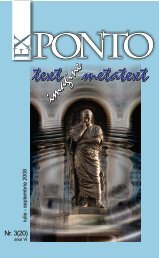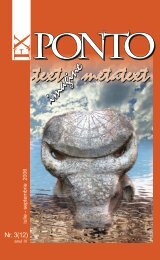Nr. 3 (32) anul IX / iulie-septembrie 2011 - ROMDIDAC
Nr. 3 (32) anul IX / iulie-septembrie 2011 - ROMDIDAC
Nr. 3 (32) anul IX / iulie-septembrie 2011 - ROMDIDAC
You also want an ePaper? Increase the reach of your titles
YUMPU automatically turns print PDFs into web optimized ePapers that Google loves.
to be both itself and its own echo; a sound so alluring and so mesmeric<br />
that the afternoon is bewitched, maybe haunted, by it. And what is so<br />
strange about that memory is that everybody seems to be floating on those<br />
sweet sounds, moving rhythmically, languorously, in complete isolation;<br />
responding more to the mood of the music than to its beat. (Friel 71)<br />
Michael’s retrospective approach symbolizes what Seamus Heaney has<br />
called Friel’s concern with “the laws of love and all their complicated relations<br />
to the operations of memory” (Heaney 231).<br />
Ultimately, the Mundy sisters deconstruct the stereotypical image of the<br />
passive, sentimental, pure Irish woman. As Roche observes, they may be<br />
defined by the things they do not do (86), as a means of opposing conventions<br />
and rules of the society. They do not take Rose to an institution though she has<br />
problems. They do not take Michael to an orphanage though it was a disgrace<br />
to have an illegitimate child in the family. They do not condemn Christina for<br />
her affair though Kate is careful not to have things happen again. Christina<br />
does not marry Gerry and raises her son without a husband. Kate eventually<br />
accepts Jack’s loss of his orthodoxy. They are non-action, however, which<br />
may be regarded as acts of defiance in Ballybeg. Friel’s use of Michael as a<br />
narrator allows the male perspective, yet it invites readers to reconsider the<br />
female approach as well.<br />
In the 1990s, when the play was performed, that generation of Irish women<br />
was trying to challenge all these constitutional and cultural restrictions. Debate<br />
about historical portrayals of women was growing. Women became visible<br />
in Irish politics when Mary Robinson was elected President of the Republic<br />
in 1990. There are other late twentieth-century controversial issues, such as<br />
unwed motherhood and religion, which would shed light on the play. In 1984,<br />
in the “Kerry babies” case, two babies were found murdered in Kerry and in<br />
Longford a young woman dies under a statue of the Virgin in labour from a<br />
concealed pregnancy. “Such cases were widely publicized and imagined in<br />
popular film and literature” (Lojek 87). Friel’s play may suggest an alternative<br />
to the discriminating attitude to unmarried mothers and illegitimate children.<br />
Christina was 19 when her son Michael was born and neither is sent away;<br />
on the contrary, they are surrounded by all the sisters with love. Seeing<br />
Michael, Jack remembers African women and the fact that love-children were<br />
considered a blessing to the household there:<br />
Jack: In Ryanga women are eager to have love-children. The more<br />
love-children you have, the more fortunate your household is thought to<br />
be. Have you other love-children<br />
Kate: She certainly has not, Jack; and strange as it may seem to you,<br />
neither has Agnes nor Rose nor Maggie nor myself. No harm to Ryanga<br />
but you’re home in Donegal now and much as we cherish love-children<br />
here they are not exactly the norm. (Friel 41)<br />
Moreover, he mentions the Ryangans’ belief in Obi, the Great Goddess<br />
of the Earth, to whom they bring sacrifices “so that the crops will flourish. Or<br />
maybe to get in touch with our departed fathers for their advice and wisdom”<br />
(Friel 47). The references to African customs and traditions are meant to create<br />
an imaginary culture in contrast with the rigidity of the Irish culture.<br />
Ex Ponto nr. 3, <strong>2011</strong><br />
179
















